
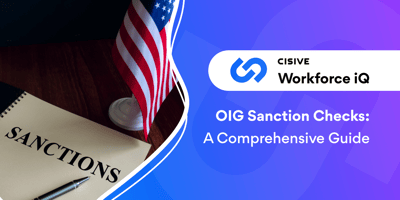
In the complex world of healthcare, OIG sanction checks are non-negotiable. These checks are far...

Healthcare sanctions background checks play a vital role in safeguarding patients, protecting organizations from legal and financial risks, and upholding the integrity of the healthcare system. When you cross-check applicants and employees against official exclusion lists, you can proactively identify people who might pose a threat to patient safety and legal compliance.
Explore the importance of compliance with healthcare sanctions rules, how these checks prevent fraud and abuse, and best practices for developing a healthcare sanctions background check program.
QuickRead:
|
Healthcare sanctions and exclusions refer to actions taken by government agencies and regulatory bodies to restrict or prohibit individuals or entities from participating in federal healthcare programs.
These programs include Medicare, Medicaid, and other government-funded healthcare initiatives. Healthcare sanctions and exclusions protect patients, prevent fraud and abuse, and maintain the integrity of the healthcare system.
Sanctions typically arise from violations of laws, regulations, or ethical standards related to healthcare services. They can be imposed on healthcare providers, suppliers, contractors, or individuals or entities involved in healthcare activities.
Sanctions can result from many types of incidents, including healthcare fraud, patient abuse or neglect, financial misconduct, or felony convictions related to controlled substances.
State licensing boards can impose lesser sanctions against individuals, while exclusions and other severe sanctions are imposed at the federal level by the Office of the Inspector General (OIG) for the Department of Health and Human Services (HHS), the Centers for Medicare and Medicaid Services (CMS), and the General Services Administration (GSA).
Section 1128 of the Social Security Act distinguishes between mandatory and permissive exclusions. An individual may incur a mandatory exclusion for:
A permissive exclusion means the HHS secretary has discretion in deciding whether to add an individual’s name to the exclusion list. Among other reasons, an individual may incur a permissive exclusion for:
To check whether a person or entity has been sanctioned or excluded, check relevant federal agency databases, such as the OIG’s List of Excluded Individuals and Entities (LEIE).
Healthcare organizations are required to screen employees, contractors, and business partners against these databases to ensure compliance and patient safety.
A healthcare sanctions background check is a process used to screen relevant individuals or entities to ensure they're qualified to work in healthcare settings or provide services.
These checks help protect patients and healthcare organizations from potential risks associated with sanctioned individuals or entities. You can be assured that your healthcare providers, employees, contractors, and vendors are in good standing and eligible for federal healthcare programs.
The background check looks at sources including the LEIE, the System for Award Management (SAM), and state Medicaid exclusion lists.
Hiring someone who's failed a healthcare sanctions check poses significant risks to healthcare organizations, with implications for patient care, financial health, and organizational reputation.
Hiring someone who's failed a healthcare sanctions check can expose your organization to potential civil monetary penalties. Government agencies such as the OIG and CMS can impose fines and other penalties on healthcare providers who employ or contract with excluded and sanctioned individuals or entities.
Employing an excluded individual or entity can result in lost reimbursement from federal healthcare programs, as well as potentially being excluded from those programs.
According to the OIG, “no payment will be made for any items or services furnished, ordered, or prescribed by an excluded individual or entity. This includes Medicare, Medicaid, and all other Federal plans and programs that provide health benefits funded directly or indirectly by the United States (other than the Federal Employees Health Benefits Plan).”
This loss of funding can harm your organization’s financial stability and ability to continue operating.
Hiring someone who's failed a healthcare sanctions check can compromise patient safety. Employing individuals with a history of misconduct or fraudulent behavior increases the risk of substandard patient care, dangerous behaviors, and ethical violations.
Patient safety can be compromised when healthcare providers neglect healthcare sanctions checks or when their process is ineffective.
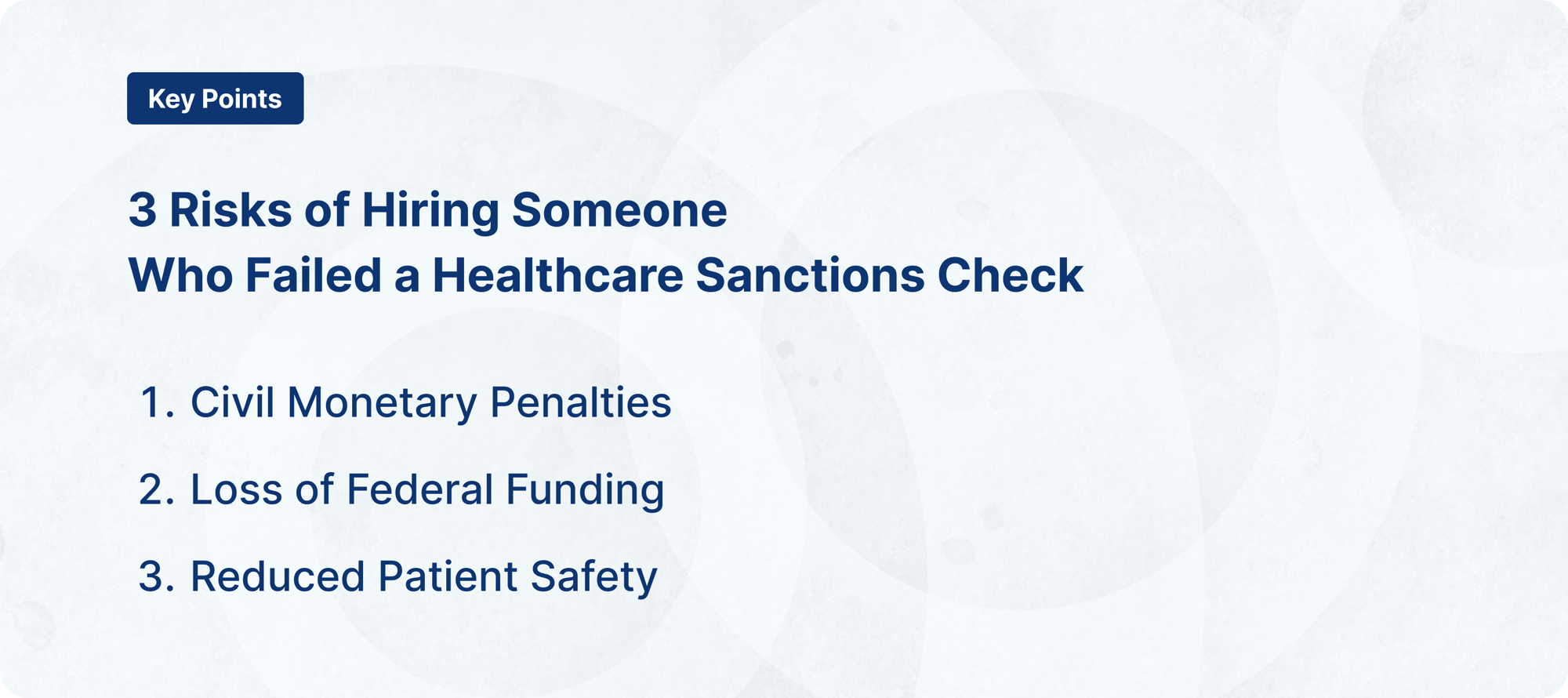
Implementing a successful healthcare sanctions background check program offers numerous advantages for your healthcare organization, starting with knowing that you’re compliant with federal law.
Healthcare organizations are bound by a variety of state and federal regulations, including those related to healthcare fraud and abuse. Noncompliance with healthcare sanction regulations can result in civil monetary penalties, loss of federal funding, and other consequences.
Conducting thorough background checks shows that your organization is committed to compliance and reinforces this principle with your employees, especially those involved in the process. By enacting an effective background check program, you reduce the worry of inappropriate activity by individuals and entities, as well as the associated financial and legal risks.
A robust healthcare sanctions background check program protects patient safety by flagging individuals or entities with a history of misconduct. Background checks will reveal recorded instances of patient abuse or neglect.
By screening potential employees, contractors, and business partners, you can avoid working with individuals and entities with a track record of patient abuse. This creates a safer environment for patients and reduces the likelihood of harm.
Implementing a healthcare sanctions background check program demonstrates your organization's commitment to safe, ethical, and responsible business practices. It showcases a proactive approach to protecting patient safety, your reputation, and the integrity of the healthcare system.
That commitment can have a big impact on your reputation, creating trust with patients, partners, and the community. This can lead to increased patient satisfaction, positive word-of-mouth, and a stronger brand image. Your reputation also helps with recruiting and retaining quality healthcare professionals, especially in a tough labor market.
Background checks can reveal past involvement in healthcare billing fraud, such as healthcare billing fraud, kickbacks, or false claims. By screening individuals involved in billing and coding processes, healthcare organizations can identify red flags or patterns that indicate a potential risk of fraudulent billing practices. This allows employers to make informed hiring decisions and prevent many instances of fraudulent activity, rather than reacting after the fact and jeopardizing the organization's financial integrity.
A robust background screening policy contributes to a culture of compliance and ethical behavior, making it clear that you won’t tolerate fraudulent activities.
Patients place their trust in healthcare institutions to provide high-quality care from reputable providers. A robust background check program gives you greater confidence that your workforce will offer the best possible care.
Patients, too, can gain confidence and trust in your provider network when they know thorough screening processes are in place. This trust enhances your reputation and strengthens patient-provider relationships.
Implementing a successful healthcare sanctions program provides peace of mind to healthcare organizations, employees, and patients. By having access to comprehensive background information, you can make informed decisions about hiring, contracting, and partnering.
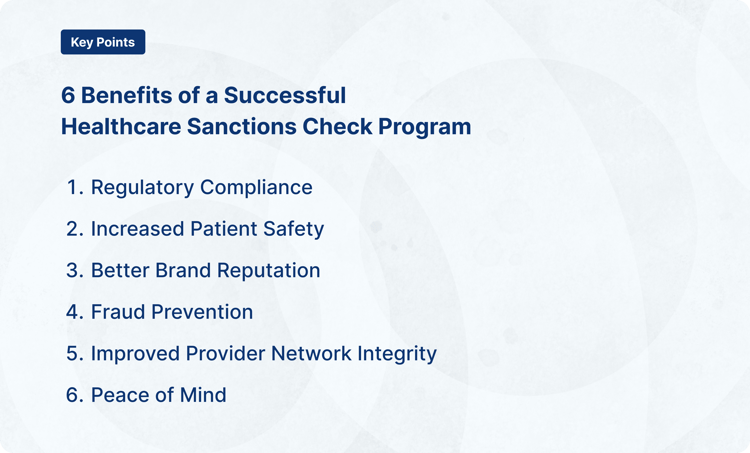
A healthcare sanctions check reveals crucial information about an individual's history of misconduct, fraud, or abuse within the healthcare industry. This comprehensive background check helps healthcare organizations make informed decisions about potential employees, contractors, or business partners. Here are some of the things you’re likely to see when conducting these checks.
A healthcare sanctions check can reveal felony convictions related to controlled substances. This includes offenses such as illegal possession, distribution, or trafficking of controlled substances. Individuals convicted of such crimes may be excluded from federal healthcare programs.
A healthcare sanctions check can uncover criminal convictions for healthcare fraud, including billing fraud, kickbacks, false claims, and other fraudulent activities. Individuals convicted of healthcare fraud may be excluded from federal healthcare programs.
A healthcare sanctions check can reveal felony convictions related to financial misconduct, such as embezzlement or money laundering. Individuals convicted of such crimes may be excluded from federal healthcare programs.
A healthcare sanctions check can uncover instances of patient neglect or abuse. This includes physical, emotional, or sexual abuse of patients, as well as neglect or mistreatment that results in harm or injury. Individuals found guilty of patient neglect or abuse may be excluded from federal healthcare programs.
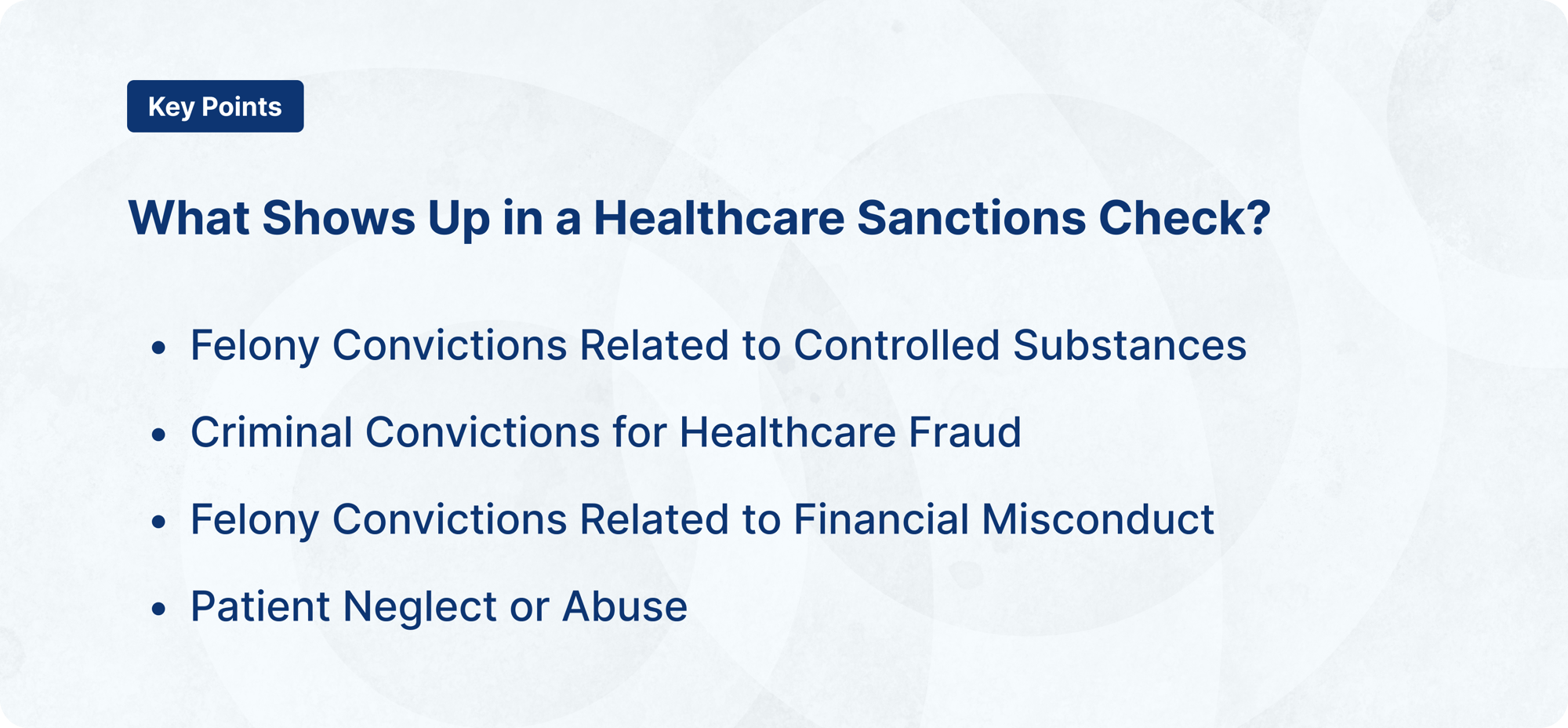
When developing or evaluating your healthcare sanctions screening program, examine these best practices. You’ll generate the best screening results, minimize risks, and maintain a high level of compliance and patient safety.
Develop a clear policy that details the requirements and procedures for conducting healthcare sanction screenings. Determine the criteria you'll use to screen employees, contractors, and vendors. These criteria will include checking for exclusions, sanctions, and disciplinary actions.
Create a written policy that outlines the purpose, scope, and process of healthcare sanctions screening. Include guidelines for initial screenings, ongoing monitoring, and handling potential matches or hits.
Work with a reputable and experienced background screening provider that specializes in healthcare, such as PreCheck’s exclusion and sanction screening solutions. Qualified partners have access to comprehensive databases and expertise in navigating complex regulatory requirements. Additionally, screening partners use advanced technology and proven processes to ensure accurate and consistent results. They have robust quality-control measures to minimize errors and false positives.
Conducting healthcare sanctions screenings in-house can be time-consuming and resource-intensive, all with the risk of obtaining subpar results. By partnering with a screening provider, healthcare providers can save time, allocate resources more efficiently, and get better results.
Establish a process and timetable for regularly checking individuals against sanction databases. This includes screening employees, contractors, and vendors, when you begin the working relationship, as well as periodic rescreenings for current employees and other stakeholders.
Many screening partners offer ongoing monitoring services. These programs help you identify individuals or entities who are sanctioned or excluded after the initial screening.
Healthcare providers need to detect all relevant sanctions, exclusions, and disciplinary actions. This is more difficult when relying only on one or two sources, using secondhand sources, or relying on databases that aren’t regularly updated. Incomplete background checks hurt your ability to guarantee patient safety and regulatory compliance.
Relevant sources include the OIG, state Medicaid exclusion lists, and other federal and state databases. A third-party provider can help you navigate this step and make sure you’re tracking all important sources of information.
Regulatory requirements related to healthcare sanctions screenings can change over time. Regularly review updates from regulatory bodies such as the OIG and CMS, and be on the watch for new laws or regulations across jurisdictions.
Many background screening partners offer advisory services to help healthcare providers navigate regulatory changes. They can provide guidance on policy updates, procedural changes, and best practices to ensure compliance as conditions change.
In addition to tracking external changes, create an internal monitoring process to identify changes in an individual's or entity's sanction status. Make sure information gleaned during rescreenings can sync with your existing records and be accessed by relevant staff.
Maintain accurate and up-to-date records from sanction screenings, including the results and follow-up actions. This documentation is essential for demonstrating compliance and can be useful during audits or investigations.
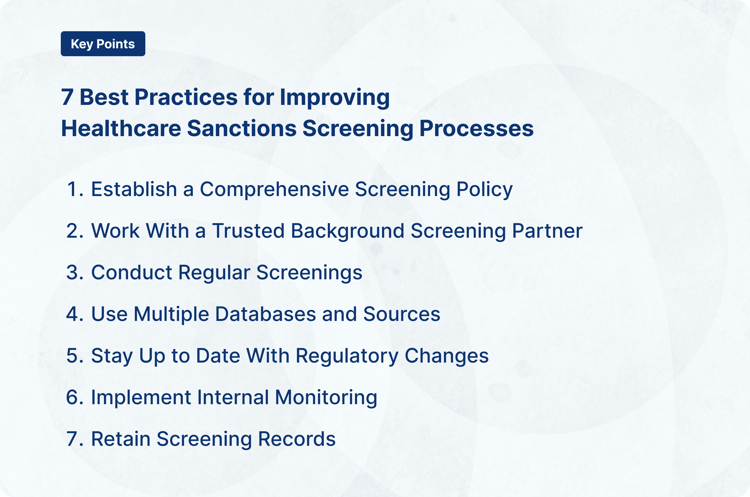
Healthcare sanctions background checks are an essential part of hiring employees, contractors, and vendors. Expect this space to evolve with updated regulatory guidelines or stricter enforcement. It's crucial for healthcare leaders to stay informed about these changes and adapt screening practices accordingly. By doing so, you maintain compliance, protect patient well-being, and safeguard your institution’s reputation.
A trusted background screening partner is an invaluable ally in the healthcare sanctions background check process. Leverage their expertise, access to comprehensive databases, and commitment to tracking regulatory changes. These partners can streamline your screening processes and make sure you work only with qualified and eligible individuals and entities.
Solve your employee background screening and hiring challenges with the most accurate employee screening services available. Schedule a time to speak with an exclusion and sanction screening expert today!

In the complex world of healthcare, OIG sanction checks are non-negotiable. These checks are far...

As PreCheck’s Principal Consultant for Sanction Screening, I work with healthcare compliance...
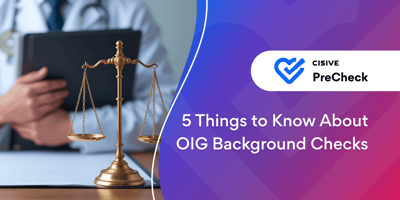
Between finding the right candidates and navigating complex regulations, hiring in the healthcare...